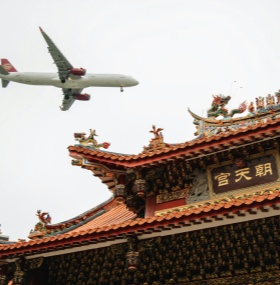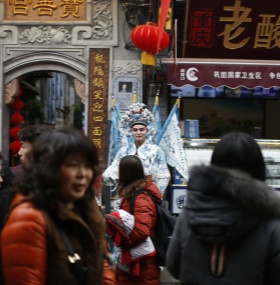Traveling to China presents unique opportunities to experience one of the world’s most vibrant cultures, but it also requires understanding how to safely manage your finances in a country with a different financial landscape. From cashless payments to managing foreign cards, it's crucial to understand China’s payment methods and the best ways to handle money. This guide will walk you through safe payment practices in China, helping you avoid financial risks and make the most of your trip.
1. Common Payment Methods in China
China is widely recognized for its cashless society, where mobile payment apps like WeChat Pay and Alipay are the norm for daily transactions. These platforms have revolutionized how people in China pay for goods and services. As a visitor, it’s important to familiarize yourself with the payment systems and use them to your advantage.
WeChat Pay & Alipay
WeChat Pay: Integrated into the popular messaging app WeChat, WeChat Pay allows users to make payments directly from their bank accounts or linked cards. It’s one of the most commonly used mobile payment methods in China, from paying for food at street vendors to booking taxis.
Alipay: Similarly, Alipay is a mobile wallet app developed by Alibaba, enabling quick payments via QR codes. Like WeChat Pay, Alipay allows users to store their payment information and easily make purchases.
Credit Cards
Foreign credit cards (Visa, MasterCard, American Express) are accepted at international hotels, high-end restaurants, and major shopping malls, but not as widely at smaller stores or rural locations.
Debit Cards: While you can use international debit cards, the transaction fees are often higher compared to using local payment methods.
Cash
While mobile payments dominate urban centers, cash (Chinese Yuan, RMB) is still needed in some rural areas, taxis, and smaller local stores.
ATMs: Most ATMs accept international cards for cash withdrawals, but fees can be high.
2. How to Safely Use WeChat Pay and Alipay
As a foreigner, setting up and using mobile payment apps can be a bit tricky. However, with some preparation, these apps can be very convenient.
Setting Up WeChat Pay & Alipay:
Download and Register: Download WeChat or Alipay from your app store. For WeChat, register with your phone number and follow the instructions to set up WeChat Pay. For Alipay, you will need to link a Chinese bank account or, in some cases, a foreign credit card to start making payments.
Verifying Your Account: Some users may need to verify their identity before using all of the app’s features. This typically involves submitting a photo ID and may require a Chinese bank account for full functionality.
Security Tips for Using Payment Apps:
Use Strong Passwords and Two-Factor Authentication: Always protect your payment apps with strong, unique passwords. Enabling two-factor authentication will add an extra layer of security to your accounts.
Double Check Payment Details: Before confirming a payment, verify the merchant’s details, especially if you're scanning a QR code. Fraudulent merchants may display fake QR codes to mislead you into sending money to the wrong account.
Avoid Public Wi-Fi: It’s advisable to use mobile data, not public Wi-Fi, when making payments to avoid the risk of hacking or data interception.
3. Managing Foreign Credit and Debit Cards
If you're more comfortable using your foreign bank cards during your stay in China, it’s important to understand the potential challenges and fees associated with using them.
Using Foreign Credit Cards in China:
Availability: Foreign credit cards are accepted in international hotels, large department stores, and major tourist destinations but may not be widely accepted in small businesses, street vendors, or local restaurants.
Fees: Be aware of foreign transaction fees and currency conversion charges. These can be significant if you use your foreign cards frequently.
Notify Your Bank: Always notify your bank about your travel plans to avoid having your card blocked due to suspicious activity.
Withdrawals and ATM Fees:
ATMs: Withdrawing cash from an ATM in China using your foreign debit or credit card is easy, but you may incur ATM fees from both the Chinese bank and your home bank.
Exchange Rates: Currency exchange rates at ATMs tend to be more favorable than exchange kiosks, but always check with your bank about fees associated with international withdrawals.
4. Be Aware of Common Scams
While China is a safe place for most tourists, it’s still important to stay vigilant, especially when handling money. Some scams involve fraudulent financial transactions, which can lead to unexpected expenses.
Common Scams to Watch Out For:
Overcharging: Unofficial taxis, tour guides, or vendors may try to overcharge tourists. Always negotiate prices upfront or opt for official ride-hailing apps like Didi to avoid being scammed.
Fake QR Codes: Fraudsters may display fake QR codes for payment. Be sure to scan the correct QR code, ideally shown by an employee or merchant, and verify the amount before confirming the transaction.
Currency Scams: In some places, counterfeit currency can circulate. Always check the currency you receive and be cautious when dealing with cash exchanges at unlicensed kiosks.
How to Avoid Scams:
Use Reputable Services: Always use well-known apps like Didi for transport, and stick to larger, trusted establishments for shopping.
Check Payment Details: When making mobile payments, ensure the merchant’s information matches what you were given. Double-check the total amount before authorizing the transaction.
Be Cautious with Cash: If you receive cash that seems suspicious, especially from street vendors, don’t hesitate to ask for a different bill or double-check the authenticity of the money.
5. Budgeting and Managing Expenses in China
Proper budgeting is key to avoiding overspending while traveling in China. Here are some strategies to help you stay on top of your finances:
Track Your Spending:
Apps for Budgeting: Use apps like WeChat Pay or Alipay to track your payments and check transaction histories in real-time.
Cashless Transactions: Limit the use of cash to minimize the risk of carrying large amounts of money. Cashless payments are more secure and easier to track.
Avoiding Unnecessary Fees:
Limit ATM Withdrawals: Reduce the frequency of ATM withdrawals to minimize international transaction fees. Opt for larger withdrawals when possible and try to use cashless payments instead.
Look for Discounts: Many shopping malls or stores offer discounts for using mobile payment apps like WeChat Pay or Alipay. Check for special offers before making a purchase.
6. Currency Exchange Tips
Exchanging foreign currency for Chinese Yuan (CNY) is straightforward, but you should be aware of the best ways to get a fair rate.
Where to Exchange Money:
Banks and Exchange Offices: The safest and most reliable way to exchange money is at banks or licensed currency exchange offices. Avoid exchanging money at airports as the rates tend to be worse.
ATMs: You can withdraw RMB directly from ATMs using your foreign debit card. These typically offer a good exchange rate, though you may encounter withdrawal fees.
Tips for Best Exchange Rates:
Avoid Airport Exchanges: Exchange your currency at local banks or exchange offices rather than at airports to avoid inflated rates.
Use International Bank ATMs: Try to find ATMs that are linked with major international banks to avoid hefty fees for currency conversions.
Related Posts
Create Your Customized Trip
Take about 2 minutes to fill the form to tell us how you like to travel, and get a reply within 1 working day.








